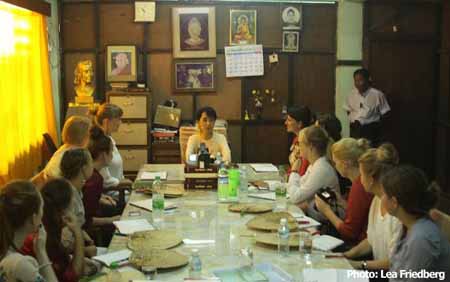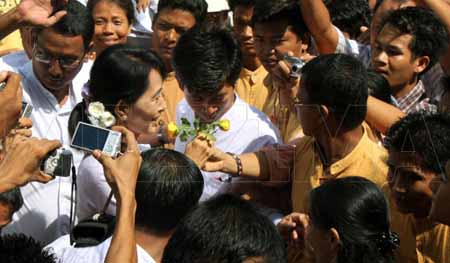(Commentary) — The room was hot and crowded. A sense of restlessness filled the air. All of us, ten young Danish students and two teachers from Denmark, shifted around nervously, some going through their prepared questions, one adjusting a video camera, others waving paper fans trying to cool down, trying to remain calm.

In just a few moments, she would enter, Aung San Suu Kyi, The Lady, the symbol of Burma's democratic struggle. She was meeting with us. It was hard to believe.
In Denmark, before coming to Burma, we had read a great deal about her as part of our preparation for an educational trip to learn about and experience the real Burma. We had learned about her struggle, her sacrifices, her political ambitions, and her uncompromising fight for freedom for her people, at the cost of her own.
The thought of her having spent 15 of the last 21 years in jail was very hard to grasp. The fact that she's been living away from her children, had been denied the opportunity to visit her dying husband, lost friends and allies, either killed, jailed or simply disappeared, was enough to almost bring our little group—all girls—to tears.
The fact that she was still ready to fight and talk with the very people who cost her so much pain astounded us and only seemed to enhance our admiration for her strength.
Coming to Burma, seeing her face everywhere, we were amazed by how much this one woman seemed to mean to the people. It made her seem a little unreal, like a symbol of something greater, more than a human being.
That’s why we were shocked when we saw her. There was no halo on her head, no choir singing as she gracefully entered and greeted us, just a beautiful lady, undoubtedly charismatic, but human just the same.
I have to admit, we did not accept that. She was very straightforward, went instantly to the point—just a brief introduction and small talk and then, what were our questions? You very quickly sensed that she was a busy woman and an experienced politician. I was fascinated. .
We talked about the criticism she was starting to endure for talking with the government, how some people felt betrayed or confused and the difficult art of flexibility and compromise over principles.
We sensed that although she was used to being criticized, these topics was still quite sensitive to her. It appeared this was much harder to take from her own supporters.
People’s eyes might light up by the mention of her name, but we also experienced people who were skeptical of her ongoing communication with the government. We were asked to question her why about she would talk with these people? Did she really believe that they could be trusted? Was she giving in and letting go of her principles?

She understood where her critics came from, but made it clear that this was not some new strategy they had all of a sudden taken upon themselves. The talk, negotiations, deals with the government, were something that they had been working on the whole time.
"When you are a political party you have to have some principles, but there is a great difference between lack of principles and flexibility,” she told us. “Just because you are unprincipled you can’t say that you are flexible, and flexible does not mean lack of principles either, you have to find the right path."
She understood that people, because they had gone through a lot of disappointments, had a hard time believing. But, as she pointed out, if they did not believe that there could be genuine change, why had they then been struggling all along?
"We have always said that we were never promising anything except that we will do our best,” she said. “And I have always been very clear that democracy doesn’t mean that everything will be handed to you on a plate, and that it is important that people in a democracy have responsibilities. No rights without responsibilities."
She underlined the role people themselves played in the struggle for democracy. Her voice strengthened and her brown eyes looked at us intently, trying to make us understand.
She pointed out that negotiations involve give and take, and their goal was not to accomplish what was best for the NLD or the government, but what was best for the people of Burma.
"We were trying to achieve exactly this,” she said, with a voice that left no doubts of her dedication "We were trying to make what seemed impossible possible, and reconciliation is possible."
We sensed her frustration. She had offered a lot, and the thought occurred to me that the fact she was a politician might offend some people.
In her case, she was not able to do anything concrete when she was under house arrest and therefore she could not be criticized for a lack of results or any other wrongdoing for that matter.
Her role as a symbol might serve to increase her popularity but it might also be quite a burden to bear if she were to disappoint, and here lies the problem.
As a politician, you have responsibilities, and there will be compromises and disappointments. This will serve to diminish her popularity among some people. This is the problem, I thought, and this is her challenge—her double role, the politician and the symbol.
She cannot be both a symbol and a politician. One part must perish for the other to grow. The symbol cannot survive in the shadows and dirt of real politics.
The politician cannot move forward, compromising, with the heavy weight of expectations that comes with being a pure symbol of hope.
When asked how she saw her role in the future, if she was going to stay in the role of a symbol of hope and a unifying figure for the country, or if she were to become a politician, she quickly cut us off.
"I am a politician!” she said emphatically. "It is not going to change. I am a member of the NLD, I have always been a member of NLD and I have always been a politician. Whenever I have to fill in an official form and they ask me what my occupation is, I always put down politician."
The last part was said with a glint of a smile in her eyes, but she was dead serious.
Regarding suggestions that she should distance herself from NLD and remain a national figure she was quite clear: that was the worse thing she could do.
"If you want to make democracy work, you should never think that you are greater than your party, that’s the way to dictatorship, that’s not the way to democracy," she said.
She said no democratic leader should ever feel that he or she was greater than the organization he or she came from, and if she were to do that, then she would not help Burma but create great harm to democracy.
"So I am a politician, that’s how it’s going to remain, but I will always work for national unity," she said.
I agree with her. Burma needs the politician more than the symbol if there is ever going to be real change. I cannot see her handling the situation any differently. Of course, a politician, no matter how skilled or popular, could never succeed to serve all interests, but still I wonder—will her political power diminish along with unifying image?
No one doubts that she will remain powerful and to a certain extent a symbol. But if the government senses that her compromising has cost her popularity, they probably will use it against her.
Negotiations involves the difficult dance of handling the different views of her supporters about how to negotiate with the government.
Should she stay away from the pseudo-democratic government that is in power now?
Or should she engage, register the NLD as an official party, continue to try to work closely with the government, or try to find a compromise between being critical and cooperative?
It was still hard to grasp, looking at this petite, elegant woman. I wondered how she could continue working under the pressure and the stress of these changing times in Burma. It made me think of something she had said when talking about how to manage difficult times and believing in change:
"You need endurance and you need faith,” she told us.
As our hour ended, we stood up and sang for her. The song was an African freedom song that had been sung during the Apartheid era in South Africa. It was a song about faith and endurance, a song about the belief that freedom would come. It seemed quite appropriate in her present circumstances.
As I left the headquarters with my class, I was thinking about the person I had just met. Our group split into three or four groups, taking taxis to different parts of the city so that the government officials who were taking our pictures as we stepped out the door onto the hot street would not follow us.
I thought about Aung San Suu Kyi. Charming, an intellectual, sharp, undoubtedly a person who demands your respect. She is not an icon. She is not a saint. She deserves to be thought of as something more, as what she is – politician.
For the future, I think that the best thing for Burma and national reconciliation would be to let her come down from the pedestal were she has been put and recognize her as a human being and a hardcore politician.
Despite the challenges that she faces, I felt an overwhelming sense of hope after our meeting. The faith of a democratic Burma could lie in no safer hands than the delicate hands of this impressive woman.



